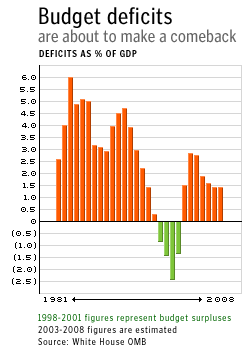NEW YORK (CNN/Money) -
The recent spat between the United States and some of its European allies about the war with Iraq has led to angry folks on both sides of the Atlantic threatening to use weapons of economic destruction, such as boycotting McDonald's in Paris or pouring French wine into gutters in New Jersey.
Most observers think the United States and its long-time trading partners will take a deep breath, return to washing down their freedom -- er, french -- fries and Les Big Macs with Coca-Cola and leave the Statue of Liberty in New York Harbor.
But if the feud is a hint of a widening political rift between the two regions, the long-term implications for the U.S. economy could be more significant.
| Related stories
|

|
|
|
|
France and Germany, which together have economic output second only to that of the United States, have opposed the U.S. decision to go to war to disarm Iraq.
Though the disagreement has gotten so heated that some Americans are boycotting French goods and some French are boycotting U.S. goods, cooler heads seem likely to prevail in the long run.
"Fifty years of increasingly free movement of goods, services and capital have led to [these] economies being so intertwined that immense damage would be done to commercial interests on both sides of the Atlantic were there to be any serious outbreak of discrimination and inevitable tit-for-tat retaliation," Lehman Brothers global chief economist John Llewellyn said in a recent research note.
America goes it alone
Already, some olive branches have been extended; France has said it would support war with Iraq if Iraq used weapons of mass destruction, and a recent poll of French citizens found most of them wanted the United States to win the war.
But if tension between the United states and its critical European trading partners continues for much longer or flares up again over other issues -- especially if the United States opens new fronts in the "war on terror" in Syria, Iran or other nations -- it could have long-term implications for the U.S. economy.
Certainly, it could further complicate the already difficult process of liberalizing trade through the World Trade Organization's Doha round of talks, which are scheduled to expire at the end of 2004. Barriers to trade of U.S. goods and services could undercut the profits of U.S. exporters.
The Wall Street Journal reported that the WTO will miss Monday's deadline to agree on liberalizing agricultural trade, critical to the Doha talks' success, in part because the United States and the European Union -- the world's biggest agriculture exporters -- couldn't come to terms about a dispute that was roiling even before the Iraq issue heated up.
The agriculture row is just the latest in a string of skirmishes between the Bush administration and other nations, including the U.S. decision to exit the Kyoto accords on global warming and the imposition of steel tariffs that the WTO has ruled are illegal.
"If the U.S. administration is in favor of free trade, it hasn't looked so much to uphold those standards at the level of the WTO," said Raymond van der Putten, Euro zone economist at BNP Paribas in Paris.
Little help from the falling dollar
Though van der Putten and other economists doubt European companies are likely to gang up to counter-balance U.S. unilateralism by boycotting goods or clamping down on trade, they might not have to -- the sorry state of the European economy might do the trick for them.
Economic slumps in Germany, France and other countries is undermining demand for U.S.-made goods, offsetting much of the benefit a recent decline in the value of the U.S. dollar might have given to U.S. exporters.
What's more, European companies aren't able to fire workers as freely as U.S. companies, so they could react to falling profits by cutting back on their investments in the United States, causing further weakness in the dollar and hurting U.S. consumers by raising the cost of imported goods.
Clamping down on investment
It's no secret that Americans consume far more than they produce, running enormous deficits in overseas trade. Financing that habit for imported goods requires a steady inflow of money from overseas.
And Europe accounted for more than 80 percent -- about $1 trillion -- of the direct investment from overseas between 1997 and 2001, according to a recent study by Jay Bryson, an economist at Wachovia Securities.

If Europeans got it in their minds to do so -- either out of a sense of pride or because they were worried about the impact of U.S. policies on the U.S. economy -- they could clamp down on that flow of money, which would send interest rates higher and undercut the value of the dollar, leading to higher inflation.
"The Achilles heel of the U.S. economy is its dependence on foreign capital...which may be the only way that Europe can keep American unilateralism in check," Bryson said.
And if Europeans force the United States to do most of the heavy lifting in rebuilding post-war Iraq, that could put further upward pressure on the U.S. federal budget deficit, already expected to be at a record high in 2003, and further depress the dollar.
"If things start to go really badly in Iraq, and we have a long conflict and have to destroy a lot of infrastructure, that would be very dollar negative because we will get stuck holding a lot of the tab for that, at a time when we have budget deficits going out as far as the eye can see," Bryson said.

|

